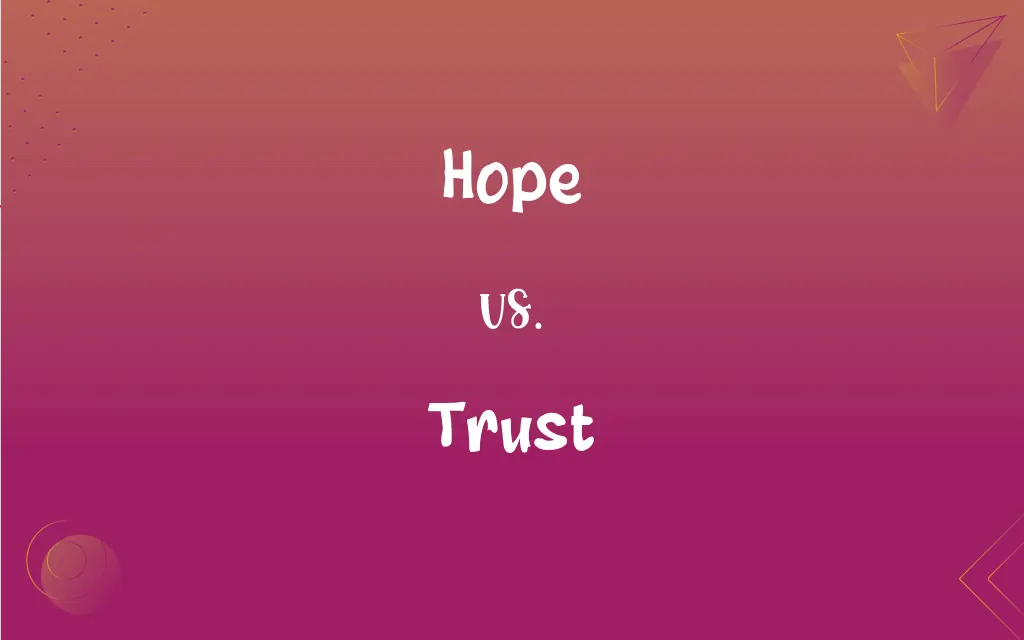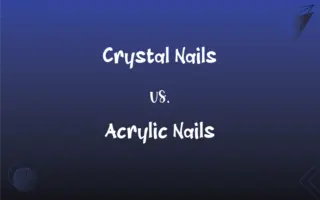Hope vs. Trust: What's the Difference?
Edited by Aimie Carlson || By Harlon Moss || Published on December 12, 2023
Hope is a feeling of expectation and desire for a certain thing to happen, while trust is a firm belief in the reliability, truth, or ability of someone or something.

Key Differences
Hope embodies an optimistic state of mind, anticipating positive outcomes in uncertain situations. Trust, in contrast, is rooted in a sense of confidence and reliability in a person, concept, or thing based on past experiences.
Hope often arises from a person's desires or aspirations, not necessarily based on evidence. Trust is built over time through consistent, reliable actions or proven facts.
In relationships, hope may reflect the desire for a positive dynamic or outcome. Trust in relationships is essential and develops from honesty, dependability, and loyalty.
Hope can motivate individuals to pursue goals or endure challenges, despite the uncertainty. Trust influences decisions and actions, often guiding how we interact with others or systems.
Hope can leave one vulnerable to disappointment if expectations are not met. Trust, when broken, can lead to a sense of betrayal and loss of security.
ADVERTISEMENT
Comparison Chart
Emotional Foundation
Optimism and desire for positive outcomes
Confidence in reliability and truth
Basis of Formation
Aspirations and desires
Past experiences and proven reliability
Role in Human Interaction
Motivates and inspires action
Essential for strong, stable relationships
Influence on Behavior
Drives toward goals despite uncertainty
Guides decisions based on confidence
Result of Failure
May lead to disappointment
Can result in feelings of betrayal
ADVERTISEMENT
Hope and Trust Definitions
Hope
A desire for certain things to happen in the future.
His hope of becoming a doctor motivated him throughout his studies.
Trust
Trust is a firm belief in the reliability or truth of someone or something.
His trust in his team's abilities was unwavering.
Hope
Hope is a feeling of expectation for a specific outcome.
She held onto the hope that she would one day return to her hometown.
Trust
An essential element in stable and secure relationships.
Their relationship was solid, founded on mutual trust.
Hope
A motivational force driving individuals towards goals.
Her hope for a better world inspired her to volunteer.
Trust
A confident reliance on the character, strength, or truth of someone.
She put her trust in her mentor, following the advice given.
Hope
An emotional state reflecting the potential for positive change.
The news brought a renewed sense of hope to the community.
Trust
Trust involves the acceptance of vulnerability based on past experiences.
Years of friendship had built a strong trust between them.
Hope
Hope embodies optimism in uncertain situations.
Despite the odds, their hope for success never wavered.
Trust
A crucial component for the functioning of societies and institutions.
Public trust in the government is vital for a healthy democracy.
Hope
To wish for a particular event that one considers possible
We are hoping for more financial support.
Trust
Firm belief in the integrity, ability, or character of a person or thing; confidence or reliance
Trying to gain our clients' trust.
Taking it on trust that our friend is telling the truth.
Hope
(Archaic) To have confidence; trust.
Trust
The condition and resulting obligation of having confidence placed in one
Violated a public trust.
FAQs
How does trust differ from hope?
Trust is a confident belief in someone or something, based on reliability and past experience, unlike the more aspirational nature of hope.
Can hope exist without trust?
Yes, hope can exist without trust, as it is often based on desires rather than evidence or experience.
Is trust easily built?
Trust is not easily built; it develops over time through consistent and reliable actions.
What is hope?
Hope is an optimistic desire for a specific outcome or future event.
Are hope and trust necessary for society?
Both hope and trust are essential for a healthy, functioning society, fostering cooperation and progress.
How does hope influence mental health?
Hope can positively influence mental health by providing motivation and a sense of optimism.
Does hope impact physical health?
Yes, a hopeful outlook can positively impact physical health by reducing stress and promoting well-being.
How do hope and trust interact with each other?
Hope and trust can interact synergistically; trust can strengthen hope, while hope can make it easier to trust.
Can a person be hopeful but not trusting?
Yes, one can be hopeful about the future while being cautious or skeptical, thus not fully trusting.
Why is trust important in relationships?
Trust is vital in relationships for stability, security, and emotional safety.
How can hope be nurtured?
Hope can be nurtured by setting goals, staying optimistic, and surrounding oneself with positive influences.
Is it possible to trust too much?
Yes, excessive trust can sometimes lead to vulnerability or being taken advantage of.
Does culture influence concepts of hope and trust?
Cultural backgrounds can influence how individuals perceive and express hope and trust.
How do children learn about hope and trust?
Children learn about hope and trust from their surroundings, experiences, and guidance from adults.
Is hope always positive?
While generally positive, unrealistic or misguided hope can sometimes lead to disappointment or inaction.
Can trust be regained once broken?
Regaining trust is challenging and requires time, consistency, and effort to rebuild.
What role does trust play in leadership?
In leadership, trust is crucial for credibility, team cohesion, and effective guidance.
What factors contribute to building trust?
Factors like honesty, reliability, integrity, and open communication contribute to building trust.
Can hope change over time?
Yes, hope can evolve based on life experiences, circumstances, and personal growth.
Can lack of trust affect mental health?
A lack of trust can negatively impact mental health, leading to anxiety, suspicion, and relationship issues.
About Author
Written by
Harlon MossHarlon is a seasoned quality moderator and accomplished content writer for Difference Wiki. An alumnus of the prestigious University of California, he earned his degree in Computer Science. Leveraging his academic background, Harlon brings a meticulous and informed perspective to his work, ensuring content accuracy and excellence.
Edited by
Aimie CarlsonAimie Carlson, holding a master's degree in English literature, is a fervent English language enthusiast. She lends her writing talents to Difference Wiki, a prominent website that specializes in comparisons, offering readers insightful analyses that both captivate and inform.







































































